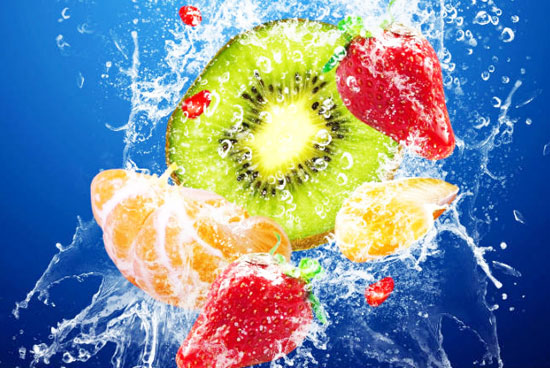The role of hydration and salt in cell energetics

Most of us are wandering around dehydrated. Our modern environments conspire to drain ever more of our hydration from us, including cell phones and commutes, drying, processed foods (i.e. pizza), sitting behind desks and in chairs, in cubicles or cars. Add prescription medications which require more water to metabolize, and you can see why we are all in low grade fatigue and fall into bed at night worried, frazzled, and yet unable to slow down and sleep. Did you know even sleep requires hydration?
Fresh Fruits and Vegetables
What can we do? The modern lifestyle must be addressed as a hydration stealer. Some surprising and necessary facts get lost in hydration advice today. Did you know that what you eat can help you hydrate?
Most fresh fruits and veggies are over 90% water. Not just watermelon, but cauliflower too. Fresh foods, even salads, bring the kind of water into us that our cells can receive more readily, hydrating us more efficiently. Fresh foods are hydration helpers on two fronts. First, the fiber in those foods help water actually absorb into your system, not just flash flood through. Secondly, fresh foods carry important minerals that create electrical charge in the water they carry, so water from food has more energizing power.
Salt for Hydration?
If your family members are not big veggie fans, you can simply add an all-natural salt to your water to create the energizing effect. That’s right – salt!
Contrary to popular belief, salt, in fact, real salt, is a necessary ingredient for hydration to move from the outside of our cell membrane to the inside of our cells where water then fuels cell function. Eight to ten eight-ounce glasses of water is the general recommendation for proper hydration, but with increased water intake, we lose salt, an essential nutrient, so we need to make up the difference. The body needs good, quality, mineral-containing sea salt, such as Celtic or Himalayan salt, that can be bought in any health food store. It can be added to drinking water in small amounts. You only need a little less than one-half teaspoon total throughout the day.
Salt is known to be an essential chemical for cellular function. As far back as the Romans, where salt was the coin by which soldiers were paid, it was understood that salt was necessary to hydrate. Not too much, but not too little.
Other new findings on hydration relate to the connective tissue found throughout our bodies, known as fascia. Fascia turns out to be far more than spongy material that holds us together and gives us shape and flexibility. It is also a previously unknown hydration irrigation system that carries not only moisture, but electrical information throughout our bodies. In order for hydration to reach all our tissues, we must be in motion.
Even little movements count, and twisting and rotating are especially hydrating, squeezing old water out and drawing in fresh hydration. So water from food, salt, and movement… not the usual advice regarding hydration, but with the emerging new science of hydration and seminal thinking about water, we must adjust our outdated approach to staying hydrated. Water is our fuel and hydration is our source.
yogaesoteric
January 31, 2019
